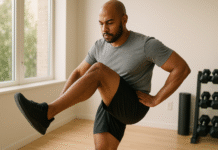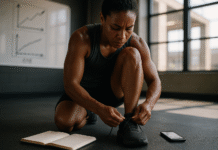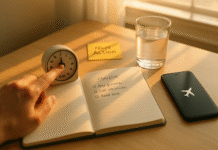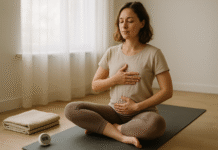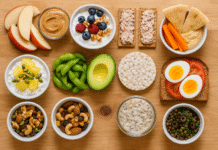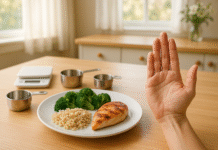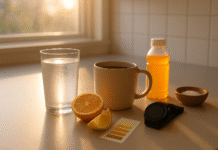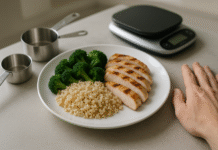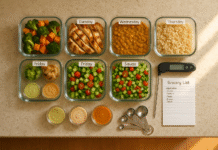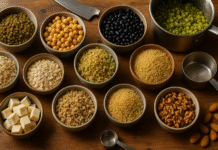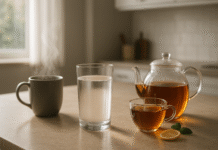Everything that happens in the body needs water. Water is the most vital factor for your health since it keeps your body temperature stable, distributes nutrients around, and gets rid of waste. It’s incredibly important to know what our bodies are attempting to tell us when our fluid levels dip below normal, yet a lot of us don’t. Most people know that being thirsty and having dark urine are indicators of dehydration, but there are many more signs that people don’t know about and often miss. You could get quite sick if you don’t pay attention to these signs.
This in-depth guide lists ten indications of dehydration that you may not be aware of. It tells you things you might not have thought of that suggest your body needs more water. You will be able to remain hydrated better, feel better psychologically and physically, and be healthier overall if you know what these indications signify. The EEAT rules specify that the advice you get should be based on expertise, authority, and trustworthiness. This article follows those rules. It derives its information from trusted medical sources including the Mayo Clinic, Real Simple, and research that has been vetted by other experts.
If you’re an athlete, a parent, a desk-bound professional, or an elderly person, paying close attention to these subtle indications might help you feel better and achieve your best. Read on to find out some surprising ways that not drinking enough water can affect your health and how to keep hydrated all day.
1. Bad Breath
Brushing and using mouthwash don’t always work to get rid of bad breath. One less obvious reason someone can always have terrible breath is that they don’t drink enough water. Saliva is particularly vital for keeping the mouth clean and getting rid of microorganisms. When you don’t drink enough water, your body creates less saliva. This helps bacteria that cause bad breath flourish and generate sulfur compounds that smell terrible. Health experts suggest that if you often have a dry mouth and foul breath, even after cleaning your teeth, you probably need to drink more water.
Less saliva not only makes your breath smell terrible, but it also makes you more likely to have oral infections, tooth decay, and gum disease. This is because saliva carries enzymes and antibacterial agents that keep your mouth healthy. Drink some water before you consume a mint. Getting your mouth wet again can help saliva flow again, get rid of food particles, and stop germs from multiplying. This will help with bad breath at its source.
2. Mood swings and being irritable
There are several things that might cause mood swings, such as stress, not getting enough sleep, or eating the incorrect foods. Lack of water might sometimes be a hidden cause. Your brain works less well when you lose even a tiny bit of fluid. This can make you grumpy, make it hard to focus, and change how you feel. Researchers have found that losing just 1–2% of your body’s fluids can change the balance of neurotransmitters and impede blood flow to the brain, which can make you feel bad and think less clearly.
People and sportsmen often get “cranky” when it’s hot outside and they don’t drink enough water. This suggests that drinking enough water can make you feel better. To keep your moods steady, try to drink water throughout day, especially before, during, and after activities that make you stressed. This will enhance your mental health and make your brain work better.
3. Not being able to focus and having mental fog
Have you ever typed the wrong word, missed a meeting, or had difficulties concentrating on anything simple? “Brain fog” is the name for these memory problems, and they could signify that you’re not drinking enough water. About 75% of the brain contains water. Dehydration can screw up neurotransmission, slow down how quickly the brain processes information, and lower blood flow to the brain.
One study found that those who were only a little dehydrated did worse on cognitive tasks than people who were well-hydrated. Their short-term memory, ability to pay attention, and overall accuracy all got poorer. Setting reminders every hour and keeping a water bottle on your desk can help you stay focused and clear-headed.
4. Wanting sugar and salt
If you don’t know why, you can suddenly prefer sweet or salty foods. You might be dehydrated or your electrolytes might be out of whack. When the body doesn’t get enough water, it holds onto fluids and minerals like sodium and potassium. These are necessary for the nerves to work and for keeping fluids in balance. During this conservation phase, your cells might not be able to use fluids properly, therefore you might particularly want salty snacks that make you thirsty and sweet snacks that offer you rapid energy.
Even though grabbing chips or soda might help these cravings for a short time, it can make dehydration worse by adding osmotic load and causing more fluid loss. Instead, drink water with a little sea salt and lemon juice to restore back the electrolytes your body has lost.
5. Pain in the muscles and joints
An imbalance of electrolytes can produce muscle cramps, but dehydration is usually the main cause. Water is needed for muscles to work, protect joints, and transfer nutrients to muscle fibers. When the amount of fluid in the body goes down, muscles may take water and electrolytes out of tissues. This can make you have unpleasant spasms and cramps while you work out or even when you don’t.
Synovial fluid, which is largely water, also helps joints deal with trauma and lessens friction. If you don’t drink enough water for a long period, it might lessen the quantity of synovial fluid in your joints. This can make them stiffer and hurt more, especially in your knees and hips, which have to hold weight. To help with cramps and joint pain, eat foods that are high in water, like cucumbers and watermelons, and drink at least 8 to 10 cups of fluids every day. If you are active or it’s hot outside, you may need to drink extra.
6. Skin that is dry or red
Skin can get dry from low humidity or harsh skin care products, but not drinking enough water can also make skin cells less plump, elastic, and able to protect themselves. When your skin is dry, it could feel tight or seem flaky or rough when you touch it. Sometimes, not drinking enough water can create inflammation in one area, which can make the skin red or flushed even when the weather is normal.
You can tell if you need to drink extra water by doing a fast pinch test. Lift the skin on the back of your hand gently and check if it snaps back soon. If your skin takes longer than usual to return to its natural state, drink water instead of applying thicker lotions. To get your skin healthy again, you need to drink plenty of water from the inside out.
7. Headache
Headaches are one of the most prevalent indications of dehydration, but they are also one of the least understood. The brain can shrink and shift away from the skull for a short time when it loses water. This helps pain receptors work, which is what causes headaches. Lack of water also makes blood vessels smaller, which means the brain gets less oxygen and nutrients, which makes the pain greater.
People who were merely a little dehydrated had far worse headaches than people who drank adequate water, according to the study. Drink water as soon as you sense a headache coming on to avoid getting one from being dehydrated. The pain may linger longer if you wait until you are thirsty.
8. Getting faint or woozy
If you feel dizzy or wobbly when you get up rapidly, it could be more than just low blood pressure. It could also suggest that you’re not drinking enough water. When the body loses fluid, blood pressure might also go down. This can make you feel dizzy or lightheaded because it can stop blood from flowing to the brain. Older folks often have this problem since their natural thirst response is weaker as they get older.
If you get severely dehydrated, you could faint or pass out from dizziness. This indicates how crucial it is to learn about it as soon as possible. Drink little amounts of water throughout the day instead than a lot all at once. This will help maintain your blood volume and pressure steady.
9. Dark rings and sunken eyes
Many people believe that not getting enough sleep or having a family history of it causes dark circles and sunken eyes. But being dehydrated can also be a huge problem. The tissue around the eyes shrinks and pouches in when there isn’t enough fluid. This generates shadows and makes the eyes look hollow. The skin surrounding your eyes is thinner and blood flows more slowly, which can make dark circles stand out more.
Drink additional water and think about putting cold compresses on your eyes to get the blood flowing. Topical therapies won’t help you heal as quickly as drinking adequate water.
10. Having trouble digesting meals and being constipated
Water is highly necessary for regular bowel motions and excellent digestion. It combines with fiber in meals to generate excrement that is soft and big, which makes it easy for the intestines to move. If you don’t drink enough water, your stool may get tougher, go through your body more slowly, and even induce constipation, which is an indication of dehydration that many people miss.
It can also be harder for the lining of your stomach to create mucus when you are always thirsty. This can make it more probable that you will have digestive difficulties, acid reflux, or even peptic ulcers. To keep your digestive tract healthy, drink at least 2 to 3 liters of water every day and consume a lot of foods high in fiber, like fruits, vegetables, and whole grains.
How to Stop and Treat Dehydration
- Plan how you will stay hydrated.
- Bring a water bottle that you can use again and again and drink from it often.
- Set reminders on your smartphone or smartwatch to go off every hour.
Get Your Electrolytes in Balance
- To receive electrolytes from natural sources, mix water with coconut water, bananas, avocados, and a small amount of sea salt.
Check the Color of Your Urine
- You should strive to make your pee a pale yellow tint. If it’s darker, you need to drink more water.
Include Foods That Have a Lot of Water
- Eating leafy greens, berries, melons, and cucumbers will help you drink more water.
Depending on what you’re doing and where you are, change things around.
- If you work out, are unwell (with a fever, diarrhea, or vomiting), or are in hot weather, drink more fluids.
Following these guidelines every day can help you stay healthy, full of energy, and cognitively alert. They will help you stay hydrated and avoid the first signs of dehydration.
In short
Thirsty is not the only indicator that you are dehydrated. Bad breath, mood swings, digestive difficulties, and sunken eyes are just a few of the odd and frequently ignored signs that it can show up. You can safeguard your health, mental clarity, and physical performance early on if you know these minor signs.
If you drink enough water, monitor the color of your urine, balance your electrolytes, and eat foods that are high in water, you won’t get dehydrated. It’s not enough to merely drink enough water to stay hydrated; you also need to maintain every cell, tissue, and organ in your body healthy. Drink enough water every day and pay attention to what your body is telling you. You might be able to stop significant problems from happening.
Questions and Answers (FAQs)
Question 1: How much water do I need to drink every day?
Women should drink around 2.7 liters (11 cups) of water a day, while males should drink about 3.7 liters (15 cups) of water a day. This includes all the liquids in foods and drinks.
Q2: Is it possible to get dehydrated even if I’m not thirsty?
Yes. Being thirsty signifies that your body is losing fluids. It’s crucial to drink water on a regular basis instead of waiting for your thirst signal. You can feel fatigued, have brain fog, or have mild headaches before you feel thirsty.
Q3: Is it better to drink sports drinks instead of water to stay hydrated?
Water is all you need for most things. You can get back the sodium and potassium you lose when you work out for a long time or sweat a lot by drinking drinks that are high in electrolytes. Pick items with less sugar or blend fruit juice with water to keep your carb intake modest.
Q4: What does caffeine do to hydration?
Caffeine isn’t a good diuretic in little amounts (up to 400 mg per day), but it can help you drink more water every day. But if you don’t drink enough water, too much coffee might make you pee more and make you even more dehydrated.
Q5: Are there some health issues that make you more likely to get dehydrated?
Yes. Some health issues, such as diabetes, kidney illness, and stomach difficulties (including diarrhea and vomiting), might cause you to lose more fluids. Some medications, such as diuretics and laxatives, might also make you lose water. For personalized guidance, go to a nurse or doctor.
References
- “6 Unexpected Signs You’re Not Drinking Enough Water, According to Health Experts,” Real Simple, accessed July 2025, Real Simple
- “10 signs you’re dehydrated—even if you’re not thirsty,” Multipure, Multipure
- “Dehydration – Symptoms & causes,” Mayo Clinic, accessed May 2025, Mayo Clinic
- “Water: How much should you drink every day?” Mayo Clinic, Mayo Clinic
- “10 critical dehydration signs & prevention tips,” GoHealth Urgent Care, GoHealth Urgent Care
- “10 signs of dehydration you must not ignore,” Care Health Insurance, Care Health Insurance
- “Signs You are not Drinking Sufficient Water,” Rutgers NJAES, NJ Agricultural Experiment Station
- “Are you dehydrated? Signs you need more water and 5 tips to help you remember to drink,” New York Post, March 4 2025, New York Post
- “33 signs of dehydration to look out for,” Evergreen Life, Evergreen Life
- “8 Unusual Signs of Dehydration,” Urgent Care of Fairhope, Urgent Care of Fairhope



